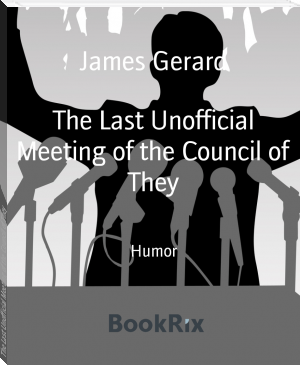The Swoop! or, How Clarence Saved England: A Tale of the Great Invasion by - (the best e book reader TXT) 📗

- Author: -
Book online «The Swoop! or, How Clarence Saved England: A Tale of the Great Invasion by - (the best e book reader TXT) 📗». Author -
It was hard.
The lot of the actual war-correspondents was still worse. It was useless for them to explain that the fog was too thick to give them a chance. "If it's light enough for them to fight," said their editors remorselessly, "it's light enough for you to watch them." And out they had to go.
They had a perfectly miserable time. Edgar Wallace seems to have lost his way almost at once. He was found two days later in an almost starving condition at Steeple Bumpstead. How he got there nobody knows. He said he had set out to walk to where the noise of the guns seemed to be, and had gone on walking. Bennett Burleigh, that crafty old campaigner, had the sagacity to go by Tube. This brought him to Hampstead, the scene, it turned out later, of the fiercest operations, and with any luck he might have had a story to tell. But the lift stuck half-way up, owing to a German shell bursting in its neighbourhood, and it was not till the following evening that a search-party heard and rescued him.
The rest—A. G. Hales, Frederick Villiers, Charles Hands, and the others—met, on a smaller scale, the same fate as Edgar Wallace. Hales, starting for Tottenham, arrived in Croydon, very tired, with a nail in his boot. Villiers, equally unlucky, fetched up at Richmond. The most curious fate of all was reserved for Charles Hands. As far as can be gathered, he got on all right till he reached Leicester Square. There he lost his bearings, and seems to have walked round and round Shakespeare's statue, under the impression that he was going straight to Tottenham. After a day and a-half of this he sat down to rest, and was there found, when the fog had cleared, by a passing policeman.
And all the while the unseen guns boomed and thundered, and strange, thin shoutings came faintly through the darkness.
Chapter 10 — THE TRIUMPH OF ENGLAND
It was the afternoon of Wednesday, September the Sixteenth. The battle had been over for twenty-four hours. The fog had thinned to a light lemon colour. It was raining.
By now the country was in possession of the main facts. Full details were not to be expected, though it is to the credit of the newspapers that, with keen enterprise, they had at once set to work to invent them, and on the whole had not done badly.
Broadly, the facts were that the Russian army, outmanoeuvered, had been practically annihilated. Of the vast force which had entered England with the other invaders there remained but a handful. These, the Grand Duke Vodkakoff among them, were prisoners in the German lines at Tottenham.
The victory had not been gained bloodlessly. Not a fifth of the German army remained. It is estimated that quite two-thirds of each army must have perished in that last charge of the Germans up the Hampstead heights, which ended in the storming of Jack Straw's Castle and the capture of the Russian general.
Prince Otto of Saxe-Pfennig lay sleeping in his tent at Tottenham. He was worn out. In addition to the strain of the battle, there had been the heavy work of seeing the interviewers, signing autograph-books, sitting to photographers, writing testimonials for patent medicines, and the thousand and one other tasks, burdensome but unavoidable, of the man who is in the public eye. Also he had caught a bad cold during the battle. A bottle of ammoniated quinine lay on the table beside him now as he slept.
As he lay there the flap of the tent was pulled softly aside. Two figures entered. Each was dressed in a flat-brimmed hat, a coloured handkerchief, a flannel shirt, football shorts, stockings, brown boots, and a whistle. Each carried a hockey-stick. One, however, wore spectacles and a look of quiet command which showed that he was the leader.
They stood looking at the prostrate general for some moments. Then the spectacled leader spoke.
"Scout-Master Wagstaff."
The other saluted.
"Wake him!"
Scout-Master Wagstaff walked to the side of the bed, and shook the sleeper's shoulder. The Prince grunted, and rolled over on to his other side. The Scout-Master shook him again. He sat up, blinking.
As his eyes fell on the quiet, stern, spectacled figure, he leaped from the bed.
"What—what—what," he stammered. "What's the beadig of this?"
He sneezed as he spoke, and, turning to the table, poured out and drained a bumper of ammoniated quinine.
"I told the sedtry pardicularly not to let adybody id. Who are you?"
The intruder smiled quietly.
"My name is Clarence Chugwater," he said simply.
"Jugwater? Dod't doe you frob Adab. What do you want? If you're forb sub paper, I cad't see you now. Cub to-borrow bordig."
"I am from no paper."
"Thed you're wud of these photographers. I tell you, I cad't see you."
"I am no photographer."
"Thed what are you?"
The other drew himself up.
"I am England," he said with a sublime gesture.
"Igglud! How do you bead you're Igglud? Talk seds."
Clarence silenced him with a frown.
"I say I am England. I am the Chief Scout, and the Scouts are England. Prince Otto, you thought this England of ours lay prone and helpless. You were wrong. The Boy Scouts were watching and waiting. And now their time has come. Scout-Master Wagstaff, do your duty."
The Scout-Master moved forward. The Prince, bounding to the bed, thrust his hand under the pillow. Clarence's voice rang out like a trumpet.
"Cover that man!"
The Prince looked up. Two feet away Scout-Master Wagstaff was standing, catapult in hand, ready to shoot.





Comments (0)